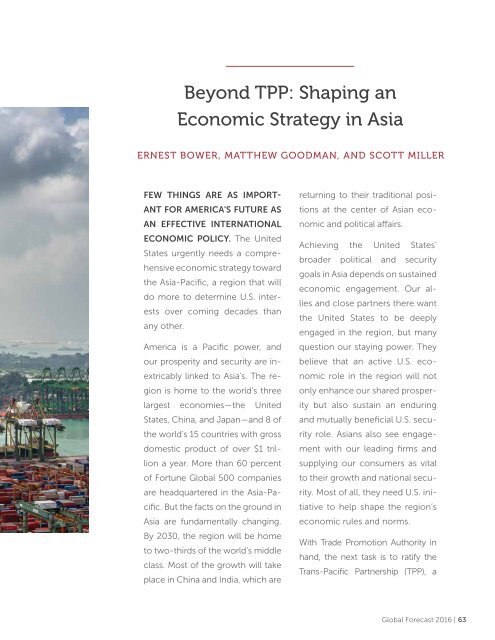Create successful ePaper yourself
Turn your PDF publications into a flip-book with our unique Google optimized e-Paper software.
Beyond TPP: Shaping an<br />
Economic Strategy in Asia<br />
ERNEST BOWER, MATTHEW GOODMAN, AND SCOTT MILLER<br />
FEW THINGS ARE AS IMPORT-<br />
ANT FOR AMERICA’S FUTURE AS<br />
AN EFFECTIVE INTERNATIONAL<br />
ECONOMIC POLICY. The United<br />
States urgently needs a comprehensive<br />
economic strategy toward<br />
the Asia-Pacific, a region that will<br />
do more to determine U.S. interests<br />
over coming decades than<br />
any other.<br />
America is a Pacific power, and<br />
our prosperity and security are inextricably<br />
linked to Asia’s. The region<br />
is home to the world’s three<br />
largest economies—the United<br />
States, China, and Japan—and 8 of<br />
the world’s 15 countries with gross<br />
domestic product of over $1 trillion<br />
a year. More than 60 percent<br />
of Fortune Global 500 companies<br />
are headquartered in the Asia-Pacific.<br />
But the facts on the ground in<br />
Asia are fundamentally changing.<br />
By 2030, the region will be home<br />
to two-thirds of the world’s middle<br />
class. Most of the growth will take<br />
place in China and India, which are<br />
returning to their traditional positions<br />
at the center of Asian economic<br />
and political affairs.<br />
Achieving the United States’<br />
broader political and security<br />
goals in Asia depends on sustained<br />
economic engagement. Our allies<br />
and close partners there want<br />
the United States to be deeply<br />
engaged in the region, but many<br />
question our staying power. They<br />
believe that an active U.S. economic<br />
role in the region will not<br />
only enhance our shared prosperity<br />
but also sustain an enduring<br />
and mutually beneficial U.S. security<br />
role. Asians also see engagement<br />
with our leading firms and<br />
supplying our consumers as vital<br />
to their growth and national security.<br />
Most of all, they need U.S. initiative<br />
to help shape the region’s<br />
economic rules and norms.<br />
With Trade Promotion Authority in<br />
hand, the next task is to ratify the<br />
Trans-Pacific Partnership (TPP), a<br />
Global Forecast 2016 | 63


